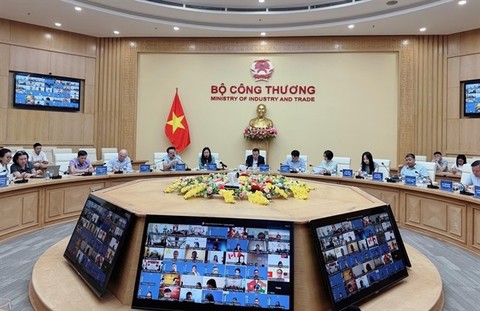
Steel production at Vietnam Steel Corporation. Steel exports from Việt Nam are facing anti-dumpting investigations from the European Union. — VNA/VNS Photo Tuấn Anh
The Ministry of Industry and Trade has analysed trade defence instruments from other countries imposed on Việt Nam’s exports and discussed measures to mitigate them in the future.
The recommendations were made as a result of the monthly meeting between the ministry and Vietnamese trade offices abroad on Monday.
Việt Nam has become a rising exporter in recent years due to its advantages in low labour and production costs, but statistics show the number of cases in which Vietnamese exports face measures against unfair trade has increased compared to the 2001-11 period.
That 10-year period saw only 50 cases recorded, while in 2020 alone there were 39 cases.
Fourteen cases have been recorded in the last nine months.
Of the 257 cases recorded since 2001, 141 cases were anti-dumping investigations, 37 were anti-circumvention, 27 were anti-subsidy and 52 were safeguard investigations.
The number of markets that impose such measures on Vietnamese exports also expanded alongside the increase in the number of cases, said Trương Thùy Linh, deputy director of the Trade Remedies Authority under the ministry.
“Apart from traditional export partners, investigations have also started from ASEAN countries, Mexico, South Africa and Taiwan (China),” she said.
More products are being investigated as well, she added, including not only those with high export turnover such as shrimp, pangasius, steel, wood and solar panels, but also those with small and medium export value and volume, such as lawn mowers, honey, paper plates and staplers.
“The scope of investigations is also expanding, including new contents such as product scope investigations and anti-circumvention of trade defence measures,” Linh said.
“More importantly, the trade defence tax rate may be pushed up due to market economy issues, since some countries such as the US have not recognised Việt Nam as a market economy, and use the costs of a third country to determine the normal value of the products in anti-dumping cases.”
Việt Nam's trade offices abroad play a crucial role in protecting the rights of Vietnamese manufacturers and exporters, Linh added.
“In many cases, as soon as they receive information from investigation agencies about the likelihood of an investigation into a product, these offices immediately inform our government,” she said.

Officials from the Ministry of Investment and Trade have an online meeting with Vietnamese trade offices abroad on Monday. — VNA/VNS Photo Uyên Hương
Đinh Quốc Thái, General Secretary of the Việt Nam Steel Association, stressed the importance of coordination between the trade offices and businesses in Việt Nam.
“The trade offices play an important role in gathering information in each stage of the lawsuits and delivering them back to Việt Nam,” he said.
“Recently we have received early warnings of possible lawsuits from them, which have helped us prepare better and have more time to develop appeal strategies when issues arise.”
Thái urged the Vietnamese trade offices in countries that import steel from Việt Nam to continue to keep track of trade investigation regulations, connect Vietnamese steel export businesses with lawyers and local importers, and take part in public consultation sessions where the complaints are filed.
In closely following Canada’s investigations on Vietnamese exports, Việt Nam Trade Counsellor in Canada Trần Thu Quỳnh said that tractor, container chassis and wind turbines may be the next type of goods to face anti-dumping investigations.
“We have also received informal information indicating that there will be a new investigation related to Vietnamese upholstered office furniture. It is also possible that the Canada Border Services Agency (CBSA) will investigate wind turbine towers and solar panels exported from Việt Nam,” she said.
To help businesses avoid being accused of dumping or evading trade defence measures, the Vietnamese trade office in Candada has organised various events to promote the Comprehensive and Progressive Agreement for Trans-Pacific Partnership (CPTPP), which focused on understanding the rules of origin and how to utilise cumulative origin principles in production, Quỳnh added.
“We have also asked the Canadian government to develop a database of imports that meet their origin standards, and facilitate effective and sustainable utilisation of free trade agreements,” she said. — VNS